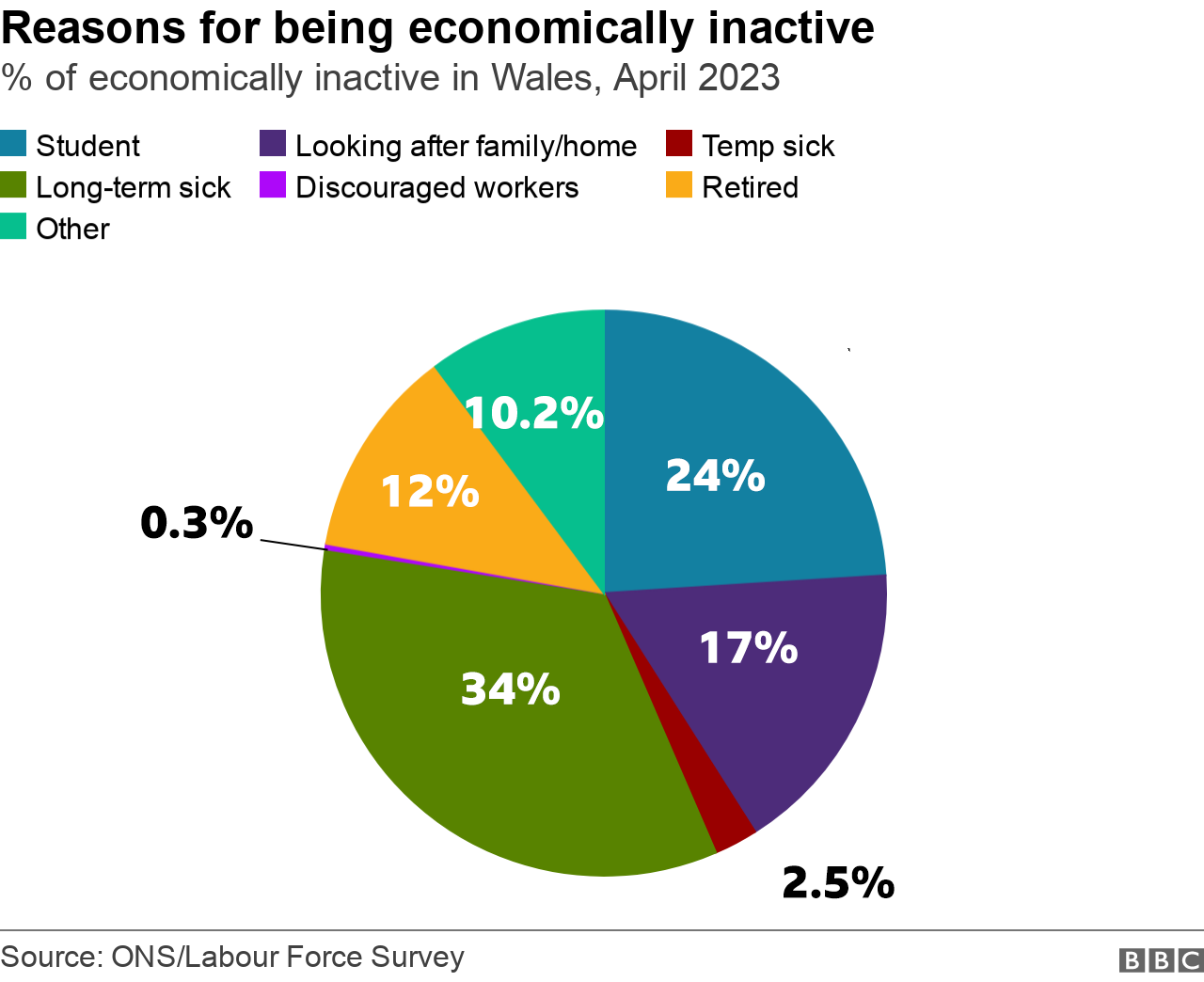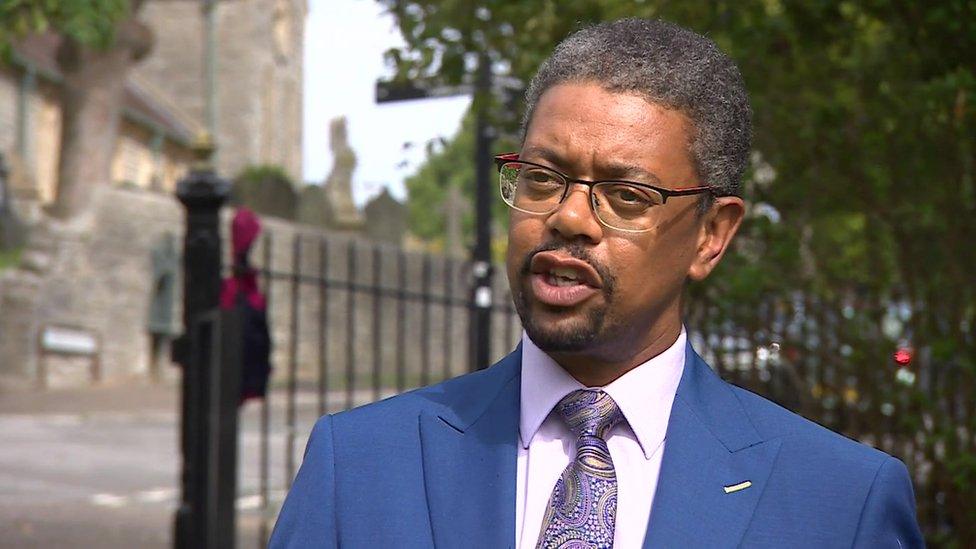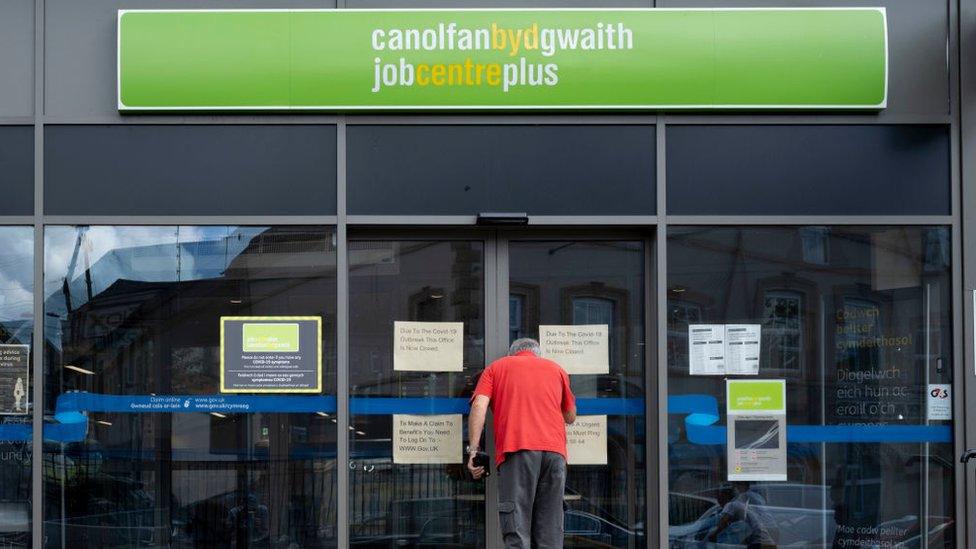Unemployment in Wales rises for third month in a row
- Published

The unemployment rate in Wales has risen for a third month in a row - to 5% of all those over 16.
It is also still ahead of the UK average and the joint highest in the UK's nations and regions, along with the West Midlands.
The jobless rate has risen by 1.2 percentage points since this time last year - the biggest rise in the UK, according to the Labour Force Survey.
It is the highest seen in Wales for more than five years.
The employment rate is 71.9%, roughly the same as last month, although this is still down 1.8 percentage points on a year ago - the largest fall in the UK.

The UK unemployment rate rose to 4%, although economists had predicted 3.8% for the latest quarter.
Meanwhile, average regular wages, not including bonuses, were 7.3% higher in the three months to May, the joint highest since records began in 2001.
Average pay in Wales rose 7.9% over the year to June 2023.
The numbers who are economically inactive in Wales - not available or wanting to work, but of working age - is 24.2%, slightly up on a year ago.
'I've still got a lot to give'
"I've still got a whole load of years ahead of me, I've got a lot to give," Eric Fletcher said.
"I've got a lot of experience and knowledge that I can share with any employer."

The 53-year-old from Tongwynlais was one of hundreds of hopefuls looking for work at a jobs fair in Cardiff.
Known as Fletch, he is living off his military pension, but with a wife and two teenage children at home, he is not ready to retire.

Eric Fletcher is a qualified rock climbing instructor
His time in the Army and the navy gave him some additional, unusual skills.
"I'm a qualified rock climbing instructor," he smiled.
"So I am looking to see if there's anything in that sort of line, either here or abroad.
"I want to stay local. But if there's a job somewhere like Dubai, somewhere really nice, then yeah, I'll travel!"

Hundreds of workers left Zimmer Biomet following the announcement of its closure last month
There have been a number of high-profile job losses in Wales in recent months.
The announcement in June of plans by medical manufacturer Zimmer Biomet to close its Bridgend plant could lead to 540 jobs being lost.
When the 2Sisters chicken plant in Llangefni on Anglesey shut at the end of March, 700 workers were made redundant.
Despite some bleak headlines about jobs, recruiters are struggling to fill some roles.

Non-skilled people are looking to build their skillset up, says Danielle Allen
"We are finding that we are getting a different calibre of candidate coming through in this recruitment process," Danielle Allen said.
She was at the jobs fair to recruit staff for Stagecoach South Wales.
The company needs drivers, engineering staff and cleaners, but Ms Allen said a shortage of skilled workers had made it difficult to recruit.
"It is a tough market out there at the moment," she added.
But the Monmouthshire Building Society was getting interest from young people hoping for a long-term role in financial services, according to its recruiter Natasha Neilson.

Natasha Neilson says there are a lot of younger applicants hoping to build a career in financial services
"People are looking for careers," she explained.
"They know that in financial services they are not just getting a job, they are getting a career."
Ms Neilson said it was "lovely to see, because it is a great industry".
The jobs fair at the Cardiff City Stadium was a mix of school-leavers, recent graduates and older people wanting a change.
"I am looking to see what's out there," said 52-year-old Karen Ferguson after 30 years in the mortgage trade left her seeking a new challenge.

Karen has worked in the mortgage trade for the past 30 years
"It strikes me as a really good time to look into alternatives to what I have been doing.
"I get bored easily! So while the market is so buoyant and there are people clamouring for everyone and anyone, I think the bar has been dropped.
"You've got more opportunities now than you would have had 10 years ago."
Despite uncertainty about the economic outlook, some sectors are continuing to enjoy growth and expansion.
A shortage of skilled staff means employers are prepared to relax their usual criteria, opening up roles to candidates who might otherwise have struggled to make the grade.

There is still a challenge to reach those of working age who are not in jobs.
There are 464,000 people who are economically inactive, which is 12,000 fewer than three months ago but 18,000 more than a year ago.
The most recent figures we have suggest more than 83% of those economically inactive are not looking for work - that includes people on long term sick, caring for relatives or who retired early.
The ONS's director of economic statistics Darren Morgan pointed to a skills mismatch, with vacancies available not suiting those looking for jobs.
"We've seen a lot of people re-enter the jobs market, and some of those people will get a job, which is obviously good news, but some of them perhaps haven't found it yet," he added.
The Welsh Conservatives said urgent action was needed on the unemployment rise "to ensure that this worrying trend does not continue".
Plaid Cymru said it was "a reflection of the lack of innovation from this government and its reactive rather than proactive approach to building a sustainable Welsh workforce".
The Welsh government said it was supporting businesses to create more quality jobs, be more flexible and provide better-paid opportunities for workers.
"Our focus remains on reducing economic inactivity," a spokesperson said, adding that it was prioritising people most in need of help.
- Published13 June 2023

- Published16 May 2023

- Published11 October 2022
